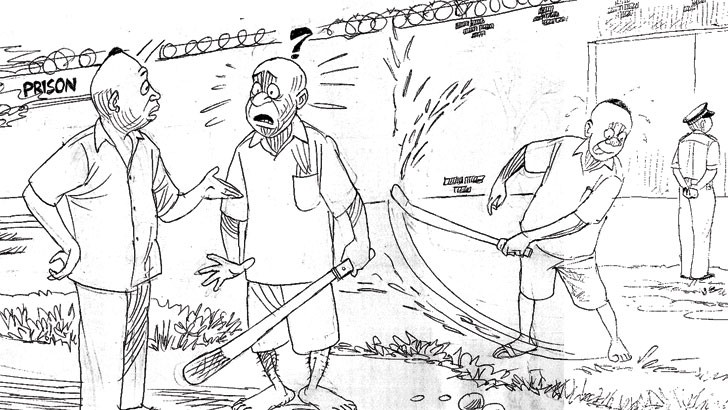Beware of foolish friend
Once a mouse and a frog were close friends. They spent most of their time together.
When the frog would go back to the pond, the mouse would miss it. In the same way, the frog grew sad every time the mouse went off in search of food.
So they took a rope and tied one end of it around the frog’s leg and the other to the mouse’s foot. Every time they missed each other, one would pull the rope to call the other.
One day, the frog went deep under water in the pond in search of food.

It forgot that its foot was tied with the mouse’s. It went deeper and deeper in the water. Soon the poor mouse was pulled into the water and drowned.
An eagle flying over the pond spotted the dead mouse.
The eagle came down, took the mouse in its beak and flew away.
The frog who was tied at the other end of the rope was also found by the eagle.
The eagle ate it too. Thus, the lives of both the friends came to an end because of their foolishness.
Indeed, a foolish friend can cause one more harm than their enemy.
Mutu Umodzi Suzenza Denga was the title for April 1992 eight Malawi Catholic bishops’ Pastoral Letter, which was read in all Catholic churches in the country on one Sunday.
The four-word folkloric title encapsulated age-old wisdom. The proverb advises leaders to accept and heed advice.
Connotatively, it means no person has a monopoly of wisdom.
The Pastoral Letter was an advice to the Malawi Congress Party (MCP) government to address several matters of national concern; the warning, sadly, then president Hastings Kamuzu Banda and MCP government, under the influence of foolish friends within, took as deplorable.
The consequence of which was dire.
Malawi Economic Justice Network (Mejn) has recently faulted the Democratic Progressive Party’ (DPP) government over continued implementation of Decent and affordable Housing Subsidy Programme (Dahsp), popularly known as Malata and Cement Subsidy, saying its costs do not make sense at the time the country’s hospitals have no drugs and no food for patients, have severe shortages of doctors and nurses and the government cannot afford to recruit 50 medical doctors and 300 nurses it has already trained; the country’s schools are short of teachers and classrooms, but trained teachers are on the street jobless, and three million Malawians face starvation.
But Minister of Lands, Housing and Urban Development Atupele Muluzi ’s response to Mejn’s advice makes him just another (but expensive) furniture addition to the new Cabinet that only assists in putting in already governance-ailing eyes of Mutharika green-tinted spectacles so that the President sees dry grey grass green.
It is dishonourable for Honourable Atupele, whose father Bakili Muluzi’s ailment that has taken him to British and South African hospitals has suddenly disappeared, particularly upon Bingu wa Mutharika’s death, to describe such a replica of former president Joyce Banda’s ‘mandasi’ economics – of distributing nkhunda, nkhuku, nkhumba, mbuzi, ng’ombe, ufa, chimanga, mbeu, mabulangeti, malata, zisani – as bringing rural or urban development.
The minister ought to know that the United Nations’ accepted definition of ‘bringing rural development’ is the process by which “the efforts of the people themselves complemented by the efforts of government authorities improve the conditions of rural communities and integrate these communities into the life of the nation to enable them to meaningfully contribute to national development through the implementation of such programmes as agriculture, health, education, home management, provision of infrastructure and other community facilities under the supervision of the government, its agencies and the local people”.
It is characteristic of a foolish friend to describe what the President is doing as ‘bringing development’.



